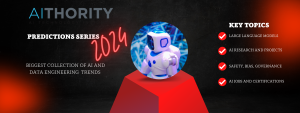CONGRUITY360 Pioneers Risk-Free “Smart Data” While Reducing Enterprise Storage and Backup Costs
Leading data management and risk mitigation provider Congruity360 risk-proofs enterprise artificial intelligence (AI) through the application of “smart data,” or data that has been strategically classified and curated to remove risky content prior to being used to train AI models. The use of smart data encourages enterprises to be specific, selective, and cautious when selecting data with which to train enterprise AI tools. Enterprises taking the “smart data” approach reduce their data footprint by an average of 30%, with associated storage savings of50%.
 Recommended AI News: Capital One Enters Enterprise B2B Software Market with Launch of Capital One Software Business
Recommended AI News: Capital One Enters Enterprise B2B Software Market with Launch of Capital One Software Business
Per Gartner analyst Don Scheibenreif, only 4% of CIOs say their data is AI ready. As businesses start folding AI tools into their technology stacks, it is imperative that caution is exercised when choosing which documents to use for AI training purposes. AI tools are only as powerful and accurate as the data used to train them; using outdated, inaccurate, irrelevant, or restricted information to train an AI tool results in unreliable and potentially dangerous outputs. Furthermore, there are generally no built-in protections to guard against how most AI tools will utilize the data with which it has been trained. Any data protection must take place prior to training the tool. Given the substantial inherent risk, federal regulations dictating protection of private data used with AI, such as the EU’s AI Act and the US’s AI Bill of Rights, are rendering AI data governance mandatory.
Data classification is the key to achieving both a smart data strategy and compliant AI data governance. Gaining a clear understanding of what aged, duplicate, trivial, and risk data exists within a given environment and being able to properly manage that data, via deletion, migration, or opting to not input it into AI tools, is only possible by first classifying that data. Beyond risk mitigation, data classification also lends itself to data storage cost savings through defensible remediation. Enterprises with robust, ongoing data classification practices, on average, eliminate 10% orphan data risk, eliminate copy data growth due to backup by 20%, and can push 20% more infrequently used data to object storage. Once AI regulations are fully in place, active data classification will also play a significant role in maintaining compliance and avoiding costly financial and reputational penalties.
“Early public and private AI solutions have yielded significant financial rewards for early adopters,” said Brian Davidson, Congruity360 Chief Executive Officer and Managing Partner. “As the impact of AI projects scale, it is essential that the fuel of AI, aka data, is correctly classified and de-risked. PII and private corporate data must be classified out of AI training models. Congruity360 is uniquely positioned to offer AI a simple, fast, and automated classification engine. Do not ruin the rewards of AI by unknowingly feeding it risk and obsolete data.”
Generative AI News:Core BTS Announces New AI Consulting Services to Help Clients Accelerate use of GenAI Technologies
Congruity360’s Enterprise Insights solution uses data classification to enable enterprises to glean insights quickly and accurately on data stores, highlighting key risk areas and opportunities to eliminate unnecessary files. Post classification, it’s easy to use only current, accurate, and risk-free files – smart data – to train AI software. “Smart data” delivers improved AI accuracy, lower AI data costs, and unparalled AI data risk mitigation. Enterprise Insights is your smart data answer to unstructured AI data platforms.
Enterprise Insights | Approach to Risk-Proof AI Adoption:
- Identify – Securely analyze PBs of unstructured data across on-premises (NAS & object) and in the cloud (files/objects & SaaS) environments. Eliminate slow and unstable file crawling tools and replace with enterprise class, API-enabled scans.
- Classify – Quickly identify key client data attributes for cost savings, risk mitigation, and AI relevance with simple to consume dashboards and drill-down capabilities.
- Review – Confidently classify your data and automate the delivery of smart data to your AI engines.
- Remediate – Seamlessly take-action (migrate and tier) on classified data to ensure it’s properly protected, optimally stored, and powering smart AI outcomes.
Recommended AI News: New Slack Innovations and Salesforce Customer 360 Integrations Unlock Team Productivity, Adding Value to the Digital HQ
[To share your insights with us, please write to sghosh@martechseries.com]

Comments are closed.